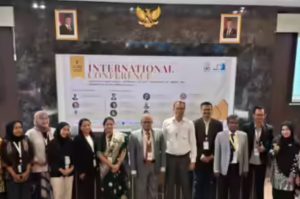AI Redefining Academic Libraries: At a recent global academic conference, a thought-provoking perspective emerged from Dr. Anil Kumar, Professor of Library and Information Science at Rashtrasant Tukadoji Maharaj Nagpur University (RTMNU), who highlighted how Artificial Intelligence (AI) is no longer a futuristic idea but an active force that is transforming academic libraries across the world.

Libraries Beyond Books: The New Digital Ecosystem
Traditionally, libraries have been associated with quiet reading spaces, endless rows of bookshelves, and manual cataloguing. However, AI has ushered in a paradigm shift. Libraries are now evolving into dynamic knowledge hubs, where digital technologies integrate seamlessly with traditional resources.
Dr. Kumar emphasized that AI is not just helping automate cataloguing and classification but also enabling personalized research assistance, predictive analytics for user needs, and enhanced access to digital content.
“Students and researchers no longer have to spend hours browsing through card indexes or PDF databases. AI-powered systems are now capable of recommending the most relevant articles, summarizing vast research content, and even detecting plagiarism in real-time,” he stated.
AI in Academic Research Support
One of the most significant areas where AI has proven impactful is in research support. AI algorithms can scan thousands of journals and provide curated insights within seconds. This helps both professors and students in identifying emerging research trends, potential collaborators, and underexplored areas in their field.
For instance, AI-driven tools like semantic search engines go beyond keyword-based searches. They understand context, intent, and connections between ideas—making it easier for scholars to access meaningful and high-quality resources.
Automation of Repetitive Library Tasks
AI has drastically reduced the burden of routine tasks such as:
- Cataloguing and metadata generation
- Book sorting and tagging
- Managing e-resources and subscription alerts
- Monitoring usage data to optimize resource allocation
This allows librarians to shift their focus from administrative work to mentorship, research facilitation, and digital literacy training.
AI Redefining Academic Libraries: Enhancing Accessibility and Inclusivity
Dr. Kumar also highlighted how AI is bridging the accessibility gap. Tools such as speech-to-text converters, real-time translation software, and AI-powered reading aids are making libraries more inclusive for students with disabilities.
For example, visually impaired students can now access a broader range of academic content through AI-driven text-to-speech software that not only reads content aloud but also interprets graphs, charts, and mathematical equations.
Ethical Concerns and Human Oversight
However, the RTMNU professor cautioned against relying excessively on AI without human oversight. He stressed that ethical challenges such as data privacy, algorithmic bias, and over-dependence on machine-generated knowledge could weaken the intellectual depth of academic research.
“AI should not replace human intellect but must complement it. Libraries must remain spaces for critical thinking, debates, and original exploration—AI should only act as an enabler,” he added.
The Future of AI-Enabled Libraries
Looking ahead, academic libraries are likely to see further integration of AI-driven chatbots, virtual research assistants, digital twins of library ecosystems, and immersive technologies like AR/VR for interactive learning.
Dr. Kumar concluded by emphasizing that the role of librarians will remain crucial. Their job will evolve into digital curators and knowledge navigators who guide students through the overwhelming digital landscape powered by AI.
A Global Shift in Academic Institutions
Globally, many leading universities such as MIT, Stanford, and Oxford have already integrated AI-powered knowledge systems into their library infrastructures. Indian institutions, too, are increasingly adopting AI to manage digital repositories, academic publishing, and student research projects.
This shift not only improves access to resources but also levels the academic playing field, ensuring that students in developing nations can benefit from advanced technologies just as much as their counterparts in developed countries.
External References for Further Reading:
- UNESCO: AI in Education and Libraries
- IFLA Report on AI and Libraries
- World Economic Forum – AI’s Role in the Future of Education
- ResearchGate: AI Applications in Academic Libraries
Also read: Home | Channel 6 Network – Latest News, Breaking Updates: Politics, Business, Tech & More

